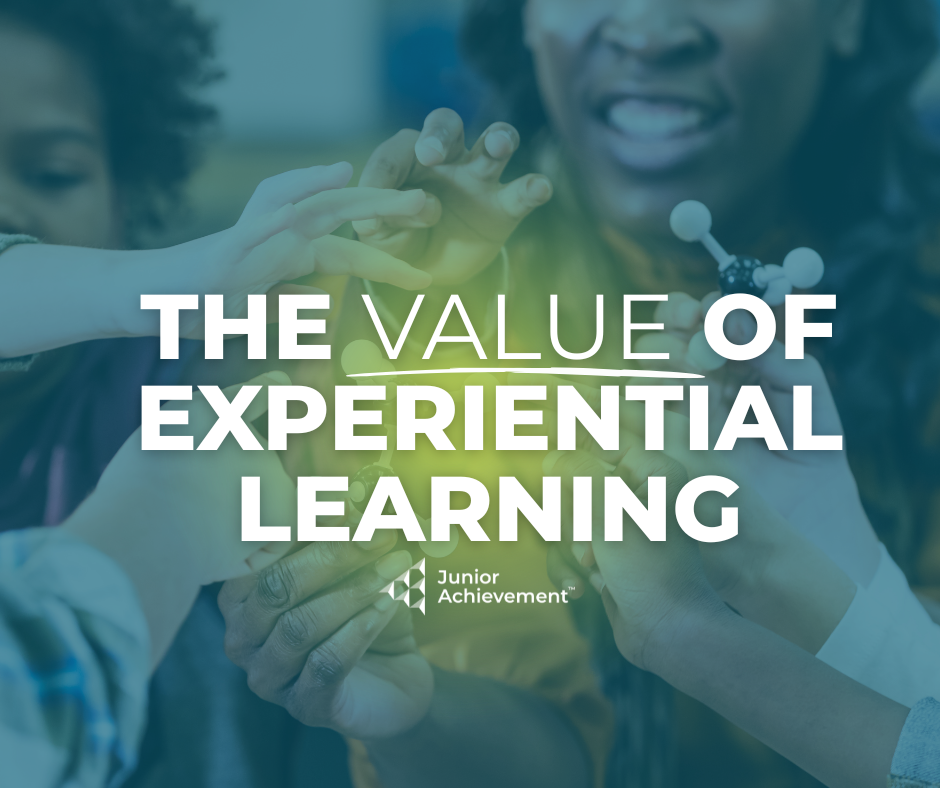Author: Elizabeth Stepanek
Work Readiness
Published:
Thursday, 07 Aug 2025
Sharing
.png/400w/50q)
Image caption: Hands on Learning with Students
In today’s rapidly evolving workforce, traditional classroom instruction alone is no longer enough. Employers increasingly seek individuals with not just technical knowledge, but also adaptability, critical thinking, collaboration, and real-world problem-solving skills. This is where experiential learning steps in, and why Junior Achievement (JA) plays a vital role in reshaping how young people prepare for their futures.
What Is Experiential Learning?
Experiential learning is a hands-on approach where students actively engage in learning by doing. Rather than passively receiving information, students participate in simulations, role-playing, collaborative projects, and real-life problem-solving experiences that mimic the challenges of the modern workplace.
This method fosters deeper understanding, retention, and skill development, making it a powerful tool in education, especially when preparing students for life beyond the classroom.
How Junior Achievement Brings Learning to Life
At the heart of Junior Achievement’s mission is the belief that all students, regardless of background, should have access to meaningful, real-world learning opportunities. JA’s experiential learning model introduces young people to concepts in financial literacy, career readiness, and entrepreneurship through interactive programs that simulate real-world scenarios.
Some examples include:
- JA BizTown® and JA Finance Park®, where students manage budgets, run businesses, and make financial decisions in simulated towns and marketplaces.
- Career exploration activities that allow students to engage with local professionals, participate in job-shadowing, or solve real workplace challenges.
- Entrepreneurial pitch programs where students create and present their own business ideas to experts.
These experiences not only build practical skills but also increase confidence, encourage teamwork, and spark curiosity about future possibilities.
The Benefits: Skills That Translate into the Workplace
Experiential learning supports the development of key competencies aligned with future workforce needs:
- Critical Thinking & Problem Solving: Students learn to assess situations, evaluate options, and make informed decisions.
- Collaboration & Communication: Hands-on activities often require working in teams, refining interpersonal and leadership skills.
- Adaptability: Real-world challenges teach students how to navigate uncertainty—an essential trait in today’s ever-changing job market.
- Engagement & Motivation: Students are more likely to connect with their learning when it feels relevant, empowering them to take ownership of their goals.
Why It Matters Now More Than Ever
Tomorrow will look dramatically different from today. As technology and automation reshape industries, soft skills and adaptability will be in high demand. Junior Achievement’s experiential learning programs help bridge the gap between classroom knowledge and career readiness, especially for students who may not otherwise have access to such opportunities.
By investing in hands-on education today, we empower tomorrow’s leaders, innovators, and problem-solvers.
Get Involved with Junior Achievement!
Select a button below to see how you or your organization can get involved with Junior Achievement of Alabama, Inc..

















